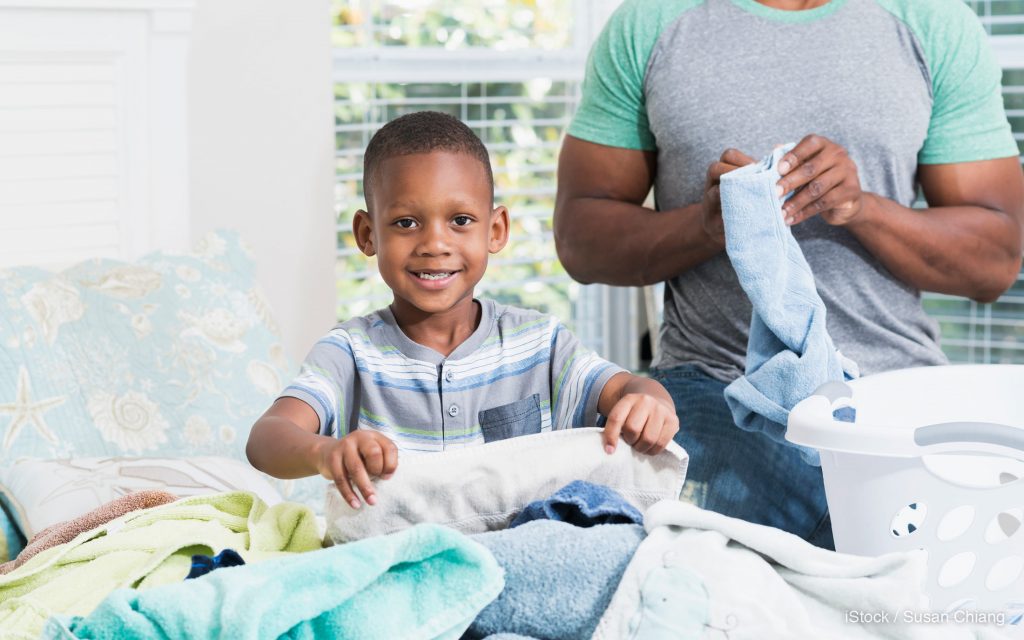Getting a toddler to do chores is incredibly frustrating. Not only are toddlers often loath to perform simple tasks in their own best interest — putting away toys, cleaning their room – all that footdragging can feel like a prelude to middle school and high school fights followed by a mixed bag of a career. That’s absurd, of course, but those anxieties come up around chores because chores for toddlers are all about letting kids practice acting more grown up. So, how best to give them? There are a few strategies to keep in mind, but the most important is this: Just do it. It might seem strict and it might seem too soon. It’s not.
“There are so many benefits to encouraging young children to have ‘chores’,” says Shanna Donhauser a child and family therapist at Happy Nest therapy in Seattle. “When we think about what a chore actually is, what we’re typically describing is a task that a family member must do to keep the home tidy or running. Young children are a part of the family and should be encouraged to select a responsibility, like everyone else.”
As soon as kids can walk, they can start taking on responsibilities. Maybe not big responsibilities, and not without a lot of guidance. But they can help clean up their own toys, put their dirty clothes in the hamper, and perform other tasks with gentle guidance and a parent for them to model, working alongside them. And as they grow older and more coordinated, they can do more. They can help clear the table, help wipe the counters, or help with cooking. It all depends on how much parents allow them to try.
“Young children thrive when given reasonable and developmentally appropriate responsibilities,’ says Donhauser. “They want to feel productive, masterful and involved in their lives and their families. Having a responsibility, like a chore, helps children feel connected to their environments, gives them a sense of ownership and confidence, and supports their social/emotional skill development.”
Toddlers are notoriously bad at time management and executing complex activities, but parents can make some simple choices to help their kids be successful. Routine and predictable chores, laid out in a toddler chore chart, can give a structure to the whole enterprise.
“If you have a routine or habit of wiping down the table after a meal, let your toddler do this,” suggest Donhauser. “Put toys away after playing with them (even if it’s just one or two). When you build the chore or responsibility into a habit or routine, you’ll find that your toddler is more cooperative and more eager to help out.”
How to Make Chores for Toddlers
Baby steps:
Parents should start slow and ramp up the consistency and frequency of the chores as the toddler gets older.
Do it together:
Parents should show kids what they need to, and help them. It’s more fun to do chores together, and it gives the kid a reason to finish.
Make it routine:
Building on an existing habit or routine encourages kids to do their chores, but if the routine is broken, they may be too cranky to follow directions.
No pay needed:
Kids live in the family home and should contribute to its maintenance. Besides, learning self-sufficiency is its own reward.
If the routine has broken down earlier in the day – for example, a snack or nap has been missed – that can affect how well a chore is done. A cranky child may not be willing to finish a chore. At this age, any task that a toddler helps a parent do will probably take longer than if the parents did it themselves. But they aren’t doing chores because it is efficient; they are doing chores because it is good for them. Chores teach them responsibility, teamwork, and accountability, all skills that will help them be successful adults. Toddlers are more likely to persevere and learn those lessons if a parent is doing a chore with them, showing them how to do it, and maybe giving them an audience to show off for.
“If you’re cleaning the window, offer your child a towel and show them how to do it,” advises Donhauser. “Most children need companionship and connection in order to complete any task. Chores are no different. Most children cannot clean up their toys alone. But your presence and help can make a huge difference. I often find that when I offer to help a child clean, I usually pick up one or two items and the child can do the rest as long as I am still with them.”
Whether or not kids should be paid for chores or jobs is debatable, but what really isn’t is that kids should contribute to the housework, and learn how to take care of themselves, bit by bit, until they go out on their own. Donhauser doesn’t recommend offering remuneration for chores, even if it’s symbolic.
“It’s very tempting for parents to begin with a sticker chart or some sort of externally validating system for completing chores,” she cautions. “If you believe that chores are just something that everyone in the family does, you don’t need to reward that with a sticker. Simply reinforce the behavior with verbal praise and a ‘thank you.’ Children naturally want to help.”


